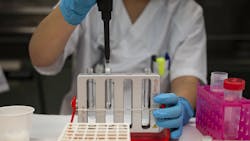APHL issues recommendations to improve pandemic testing strategy
The Association of Public Health Laboratories (APHL) issued recommendations to improve testing for the SARS-CoV-2 virus and for future pandemics.
In Smart Testing for Optimizing Pandemic Response, APHL identifies shortcomings in the U.S. response to COVID-19 and outlines the following actions to improve the pandemic testing situation:
· Develop and implement a national testing strategy for the SARS-CoV-2 virus;
· Address supply chain issues that have led to shortages of testing reagents and supplies;
· Monitor the ongoing development and field evaluation of new diagnostic tests; and
· Perform national surveillance for emerging mutations in the virus and modify the national pandemic mitigation strategy accordingly.
“We are nearly a year into our response to COVID-19 and while we have made progress, we still face chronic challenges,” said Scott Becker, chief executive officer of APHL. “The lack of a coordinated national approach is the most vexing. We look forward to working in a coordinated and transparent way with the incoming administration and partners to support improved testing going forward and turning the tide on this deadly pandemic.”
With much of the diagnostic and screening testing now conducted by clinical and commercial laboratories and vaccine distribution under way, APHL recommends that public health laboratories begin evaluating the impact of immunization. Public health laboratories should offer testing to assess vaccine efficacy, vaccine failure and conducting molecular subtype surveillance to monitor changes in the virus that could affect the ability to detect and control the virus.
To improve pandemic testing in the future, APHL recommends creating a robust national testing framework that includes guidance from public health laboratories to ensure a more orderly and predictable rollout of testing and to provide for an adequate supply chain and workforce. APHL also urges consistent messaging around test plans and setting expectations that are appropriate, realistic and free of political overtone.
“We’ve outlined a range of steps that will strengthen our response to COVID-19 now along with actions to ensure that we are better prepared for future pandemics,” said Kelly Wroblewski, director of infectious diseases at APHL. “This, of course, requires adequate funding for our nation’s public health laboratories so they are amply equipped and sufficiently staffed.”
Public health laboratories have played a critical role in the pandemic response by testing for the initial detection of the novel threat and in diagnostic testing as clinical and commercial laboratories ramped up their testing capacity. With testing in clinical settings now widespread, public health laboratories should resume their typical role and focus much of their testing on protecting at-risk populations and surveillance-based testing, such as outbreak investigation and monitoring the effectiveness of public health interventions. APHL strongly recommends considerable strategic and operational shifts to get our pandemic response on the right track.
The Association of Public Health Laboratories Lab Blog has the release.
